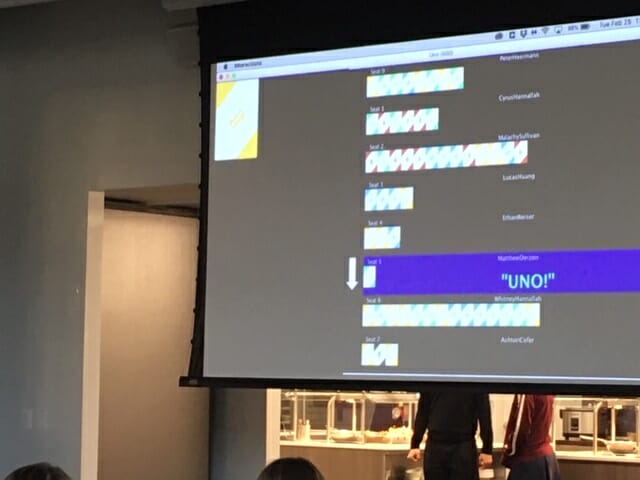(Courtesy/Emily Dennett)
On Tuesday, February 25, students in the Honors Computer Science 2 and 3 classes duked it out in the Dining Hall by playing a childhood classic: Uno-or rather, the “bots” that they coded did the brawling for them.
To provide some context, the HCS3 class has a unit in the second semester that covers AI-like topics, with the final goal being that each student implements these concepts when they program a bot for a game of the students’ choice. This year, Uno came out on top of similar games, like Battleship, Euchre, and Hearts, after an anonymous vote from the students.
This has become a long-standing tradition that many underclassmen look forward to. While Uno still follows the motif of past games–the last HCS3 class decided upon Poker as their game–this was the first year that students in HCS2 could also participate.
Although the crux of the game is still Uno, the players are looking to get rid of their cards as fast as possible: with tweaked rules to allow for a form of elimination. As such, they are as follows:
You are still playing Uno: you can match either number or color and your goal is to get rid of all of your cards as quickly as possible.
When someone runs out of cards, your remaining card’s point values are added to your total score. Number cards have the value of the card (e.g. a red 8 would give you 8 points). Draw 2’s, Reverses, and Skips give you 20 points, and Wilds and Wild Draw 4’s allot 50 point apiece.
Thus, the goal is to keep your score as low as possible. When you hit 500 points, you are eliminated.
This was also the first time that the competition on display for the entire school to see, created out of necessity by both the addition of another HC3 class and the aforementioned inclusion of HCS2 classes. In the past, the one HCS3 class would have just hosted the match during the scheduled class-time, but that’s not feasible anymore with the incorporation of several blocks.
The finale, hosted in the fire-side of the Dining Hall, had eight representatives, with Lucas Huang’21 coming out on top of the live tournament.
Ashton Cofer, who won the extended overnight tournament, said, “This was my second year competing in the Computer Science AI Challenge and I thoroughly enjoyed it. It was so cool to see students from different grades and classes coming together and having fun with computer science. . . One aspect that I found fascinating was that although Uno is mostly luck when you only play a few games, small changes in strategy can have a significant impact once you play millions of games.”
This year’s tournament was a massive success, and it’s exciting to think about what games these talented programmers with try and tackle in the future.








